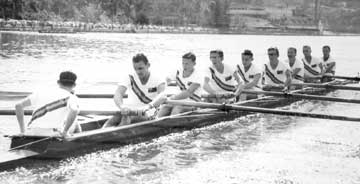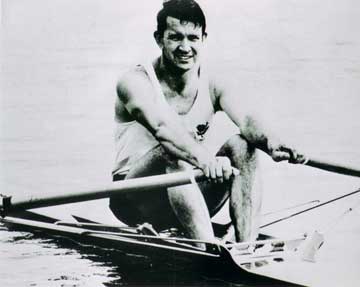Olympic Games—Rome 1960
The combined East and West German team dominated the regatta and a record thirty three nations competed. The results for Australia were disappointing, with only the coxed four making the final after rowing through the repechage.
This regatta saw the introduction of lighter and more revolutionary shaped boats. The Australians raced in older styled boats including the only stern coxed pair at the regatta which was also twice the weight of the lightest pair in the competition.

Men's Eight
The Australians returned home with much useful knowledge - the scientific approach of the Germans, the rigorous approach of the Canadians, the use of lighter boats with differing rigs and the need for greater racing experience. However the key lesson of 1960 was the need for greater acclimatisation and international competition. The eight's coach in his report included the following recommendations:
"The need for a longer acclimatisation period at or near the venues I cannot stress too strongly. A stricter check on food available and its suitability to particular sports would help to maintain a diet already established in Australia. I am sure that oil cooked preparations at Rome did not suit the average Australian. Weight and energy loss are a vital factor in my estimates.
"International competition prior to future Olympic competition gives atmosphere and edge to any crew and should be included in the programme of rowing teams if possible. European crews race in tough competition very frequently and their standard was very high as a result. Our isolation of course makes this difficult to arrange."
These recommendations form a key part of the preparation of any modern crew. Ken Grant also made some equipment recommendations.
Selection
The Western Australian crew won the King's Cup race decisively on the Tamar River Devonport in Tasmania on 19th March 1960 and was selected without alteration. The inclusion of eastern state oarsmen was discarded owing to variations in style and employment difficulties during training. The eight's coach therefore recommended that the coxless pair not be used as emergencies in future because of the lack of cohesion on style.
Mackenzie also was selected without further trial. The AARC wished to send a full team and appointed the grading committee to preside over the test races in Victoria and New South Wales for the other boats.

Stuart Mackenzie
Due to a cross breeze at the Victorian test races in Ballarat the grading committee postponed racing for one day even though the course was eminently rowable. The next day the course was perfect; the pairs race was won by 2 feet and the coxed four was won by three feet, justifying the grading committee's decision.
The grading committee graded the team as follows: 1st – Single Scull, 2nd – Eight, 3rd Coxless Pair, 4th Coxed Four, 5th Coxed Pair, 6th Double Scull and 7th Coxless Four. The AOF selected and funded the first three graded crews and the other crews were selected on the basis of self financing. Only one coach was selected and so Messrs Edward Curtain (NSW) and Peter Evatt (NSW) who coached the men's coxed four and Mr Ron Jelbart (VIC) who coached the men's coxless four were not official members of the team. Again the lack of coaching support to the team was an issue for the small boats. Mr Ken Grant (WA) received an OAM for services to rowing.
This Olympic regatta was conducted at Lake Albano and saw the introduction of individually buoyed lanes as it was impractical to use the usual overhead markers. This system of buoying was thereafter known as albano buoying after Lake Albano in Italy and has been used ever since.
Australian Team
Men's Single Scull – Illness prevented Mackenzie from starting
- Stuart A Mackenzie (NSW)
Men's Double Scull – eliminated in repechage
- Bow: Ian V Tutty (NSW)
- Str: Kevyn P Webb (NSW)
Men's Coxless Pair – eliminated in repechage
- Bow: John A Hunt (VIC)
- Str: Terrence R Davies (VIC)
Men's Coxed Pair – eliminated in repechage
- Bow: Paul M Guest (VIC)
- Str: W Neville Howell (VIC)
- Cox: Ian D Johnston (VIC)
Men's Coxless Four – eliminated in repechage
- Bow: Brian Vear (VIC)
- 2: Peter J Guest
- 3: Peter L Gillon (VIC)
- Str: J M (Kim) Jelbart (VIC)
Men's Coxed Four – fifth
- Bow: Maxwell Annett (NSW)
- 2: Graeme Allan (NSW)
- 3: Peter Waddington (NSW)
- Str: John D Hudson (NSW)
- Cox: Lionel P Robberds (NSW)
Men's Eight – eliminated in repechage
- Bow: Milton A Francis (WA)
- 2: Geoffrey A Hale (WA)
- 3: John R Ledder (WA)
- 4: Alexander M Cunningham (WA)
- 5: Maxwell S Gamble (WA)
- 6: Berry H Durston (WA)
- 7: Rodger A Ninham (WA)
- Str: John G Rosser (WA)
- Cox: Terrence J Scook (WA)
- Coach: Kenneth D Grant (WA)
Manager: Reg G Blundstone (TAS)
Grading Committee: Dr Lloyd S Williams (VIC) and Messrs
Peter Evatt (NSW) and Jack Berkery (TAS)
Australia's Olympic Team Captain was Kevyn Webb (NSW).
Racing
Men's Single Scull
E1: 1st NZL, 2nd GER, 3rd USA, 4th AFS, 5th ESP
E2: 1st URS, 2nd NED, 3rd POL, 4th SUI
E3: 1st ITA, 2nd FIN, 3rd AUT, 4th GBR
R1: 1st GER, 2nd AUT, 3rd ESP
R2: 1st USA, 2nd NED, 3rd GBR
R3: 1st POL, 2nd FIN, 3rd AFS
Final: 1st Vyacheslav Ivanov (URS) 7:13.96, 2nd Achim Hill (GER) 7:20.21,
3rd Teodor Kocerka 7:21.26, 4th NZL, 5th USA, 6th ITA (13 scullers)
Viatcheslav Ivanov repeated his win in 1956 with a win from behind. Teodor Kocerka from Poland avenged his fourth place in Melbourne with a bronze medal at these Games. Mackenzie unfortunately did not race due to illness.
Men's Double Scull
E1: 1st FRA, 2nd NED, 3rd YUG, 4th USA, 5th GER, 6th AUS
E2: 1st TCH, 2nd URS, 3rd GBR, 4th NOR, 5th DEN
E3: 1st SUI, 2nd BEL, 3rd AUT, 4th URU, ITA eliminated for two false starts.
R1: 1st NED, 2nd NOR, 3rd DEN, 4th AUT
R2: 1st URS, 2nd URU, 3rd YUG, 4th ITA, 5th AUS
R3: 1st BEL, 2nd GBR, 3rd GER, 4th USA
Final: 1st TCH (Vaclav Kozak, Pavel Schmidt) 6:47.50, 2nd URS 6:50.49,
3rd SUI 6:50.59, 4th FRA, 5th NED, 6th BEL (16 crews)
The Czech crew defeated the Russians who had been unbeaten since 1955.
Men's Coxless Pair
E1: 1st GER, 2nd AUT, 3rd MEX, 4th NED, 5th CAN
E2: 1st ITA, 2nd ARG, 3rd DEN, 4th ROM, 5th SWE
E3: 1st FIN, 2nd USA, 3rd YUG, 4th AUS, 5th PER
E4: 1st URS, 2nd SUI, 3rd GBR
R1: 1st AUT, 2nd AUS, 3rd GBR
R2: 1st MEX, 2nd ARG, 3rd PER
R3: 1st USA, 2nd DEN, 3rd NED
R4: 1st YUG, 2nd SUI, 3rd CAN, 4th ROM
SF1: 1st GER, 2nd FIN, 3rd YUG, 4th MEX, 5th AUS, DEN did not finish
SF2: 1st AUT, 2nd URS, 3rd USA, 4th ITA, 5th SUI, 6th ARG
Final: 1st URS (Valetin Boreyko, Oleg Golovanov) 7:02.01, 2nd AUT 7:03.69,
3rd FIN 7:03.80, 4th GER 7:08.81, 5th USA, 6th YUG (18 crews)
Men's Coxed Pair
E1: 1st URS, 2nd USA, 3rd TCH, 4th YUG, 5th GBR, 6th GRE
E2: 1st ROM, 2nd NED, 3rd URU, 4th ARG, 5th ESP, HUN disqualified
E3: 1st GER, 2nd DEN, 3rd URU, 4th AUS, 5th ITA, 6th BEL
R1: 1st USA, 2nd URU, 3rd ARG, 4th ESP, 5th BEL
R2: 1st ITA, 2nd TCH, 3rd NED, 4th AUS, 5th GRE
R3: 1st DEN, 2nd YUG, 3rd GBR, 4th SWE, 5th HUN
Final: 1st GER (Bernhard Knubel, Heinz Renneberg, Klaus Zerta) 7:29.14,
2nd URS 7:30.17, 3rd USA 7:34.58, 4th DEN, 5th ITA, 6th ROM (18 crews)
Men's Coxless Four
E1: 1st GBR, 2nd USA, 3rd POL, 4th HUN, 5th DEN, 6th FIN
E2: 1st TCH, 2nd ROM, 3rd AFS, 4th AUS, 5th CAN
E3: 1st URS, 2nd ITA, 3rd GER, 4th SUI, 5th ARG
R1: 1st USA, 2nd GER, 3rd CAN, 4th AUS
R2: 1st SUI, 2nd ROM, 3rd POL, 4th ARG FIN scratched
R3: 1st ITA, 2nd HUN, 3rd DEN, 4th AFS
Final: 1st USA (Arthur Ayrault, Ted Nash, John Sayre, Richard Wailes)
6:26.26, 2nd ITA 6:28.78, 3rd URS 6:29.62, 4th TCH, 5th GBR, 6th SUI (16
crews)
The winning American crew contained Ted Nash who was to become a key coach of American teams for the next 40 years.
Men's Coxed Four
E1: 1st ITA, 2nd AUS, 3rd ROM, 4th FIN, 5th GRE, 6th ESP
E2: 1st GER, 2nd HUN, 3rd DEN, 4th POR, 5th BRA
E3: 1st TCH, 2nd USA, 3rd NED, 4th GBR, 5th JPN
E4: 1st URS, 2nd AUT, 3rd FRA, 4th YUG, 5th SWE
R1: 1st FRA, 2nd AUS, 3rd GBR, 4th BRA
R2: 1st HUN, 2nd ROM, 3rd YUG, 4th JPN
R3: 1st USA, 2nd FIN, 3rd YUG, 4th JPN
R4: 1st AUT, 2nd NED, 3rd POR, 4th GRE, 5th ESP
SF1: 1st ITA, 2nd AUS, 3rd HUN, 4th FIN, 5th TCH, 6th AUT
SF2: 1st GER, 2nd FRA, 3rd URS, 4th USA, 5th ROM, 6th NED
Final: 1st GER (Gerd Cinti, Horst Effertz, Klaus Rieckermann, Jurgen Litz,
Micheal Obst) 6:39.12, 2nd FRA 6:41.62, 3rd ITA 6:43.72, 4th URS, 5th
AUS, 6th HUN (21 crews)
Phil Cayzer, who assisted with the coaching of the coxed four, commented that whilst the Australian four was quite sound, it did not come together in the final preparations.
Men's Eight
E1: 1st TCH, 2nd AUS, 3rd EGY, 4th SWE
E2: 1st GER, 2nd FRA, 3rd GBR, 4th JPN, 5th SUI
E3: 1st CAN, 2nd USA, 3rd ITA, 4th URS, 5th ESP
R1: 1st ITA, 2nd JPN, 3rd SUI, 4th AUS
R2: 1st FRA, 2nd URS, 3rd EGY, 4th ESP
R3: 1st USA, 2nd GBR, 3rd SWE
Final: 1st GER (Klaus Bittner, Karl-Heinz Hopp, Hans Lenk, Manfred Rulffs,
Frank Schepke, Kraft Schepke, Walter Schroder, Karl-Heinrich von Groddeck,
Will Padge) 5:57.18, 2nd CAN 6:01.52, 3rd TCH 6:04.84, 4th FRA, 5th USA,
6th ITA (14 crews)
The Americans were finally beaten in an Olympic Eights race by a great German crew from Kiel–Ratzeburg.
At the time of selection, coach Ken Grant believed that the crew needed to improve some 10 seconds to make the finals. He planned to achieve this through "more efficient strength – weight ratio developed by a power increase from our winter physical training programme prior to Rome". The crew however suffered more from lack of acclimatisation and race practice. It also lost a lot of weight in Rome through illness and inappropriate food and therefore lacked energy. The coach Ken Grant reported:
"A rating drop occurred in the 3rd leg of the heat and Australia dropped from first to third position to challenge again in the last 500 but went down to a strong Czech crew which subsequently were placed 3rd in the final. In training the crew always showed ability to row out four even legs and the lapse in the 3rd I can only put down to physical loss.
"Headwind conditions in the repechage found the eight wanting in the last 500 metres and a fade to fourth placing was a disappointing conclusion for a thoroughly exhausted crew."
The crew had a bad start in the heat which was probably due to lack of race practice. Their last race had been in the King's Cup. The crew believed that they should have won this race. The lack of medical support was also a factor as minor illnesses should have been dealt with quickly. In summary the crew members did not have the opportunity to race at their best.

